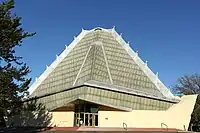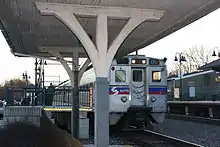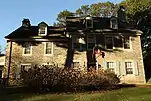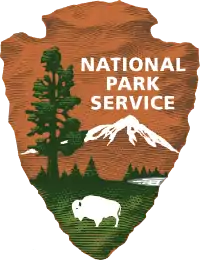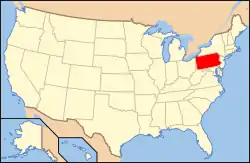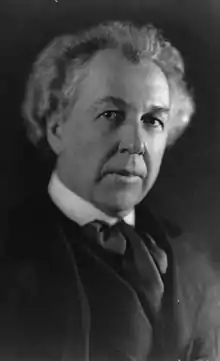Beth Sholom Congregation (Elkins Park, Pennsylvania)
Beth Sholom Congregation is a Conservative synagogue located at 8231 Old York Road in the Philadelphia suburb of Elkins Park, Pennsylvania. It is the only synagogue designed by famed architect Frank Lloyd Wright. Beth Sholom is Hebrew for House of Peace. Completed in 1959, it has been called a "startling, translucent, modernist evocation of an ancient temple, transposed to a Philadelphia suburb by Frank Lloyd Wright.[4] It was designated a National Historic Landmark in 2007 for its architecture.[5]
Beth Sholom Synagogue | |
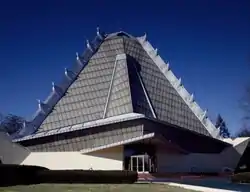 | |
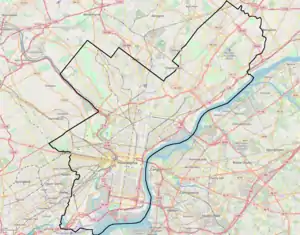 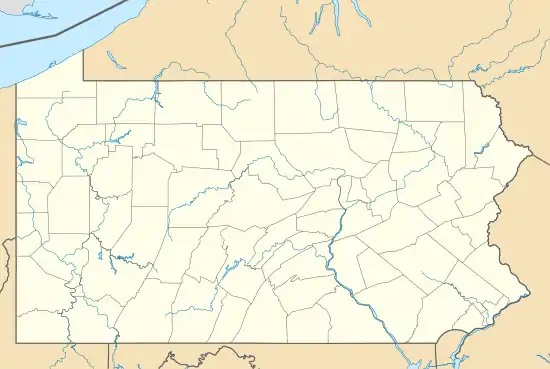  | |
| Location | 8231 Old York Road Elkins Park, Cheltenham Township, Pennsylvania, USA |
|---|---|
| Coordinates | 40°4′56″N 75°7′36″W |
| Area | 3.9 acres (1.6 ha) |
| Built | 1959 (completed) |
| Architect | Frank Lloyd Wright |
| Architectural style | Modern |
| NRHP reference No. | 07000430[1] |
| Significant dates | |
| Added to NRHP | March 29, 2007[1] |
| Designated NHL | March 29, 2007[2] |
| Designated PHMC | September 21, 2008[3] |
Congregation
The congregation originally established a synagogue in the Logan neighborhood of Philadelphia in 1919. It was one of the first congregations to move to the suburbs at its present home in the 1950s. Bernard Wolfman, Dean of the University of Pennsylvania Law School, and his family attended the synagogue.[6]
Clergy
Rabbis
- 1919–1964: Rabbi Mortimer J. Cohen
- 1964–2000: Rabbi Aaron Landes
- 2000–2003: Rabbi Gershon Schwartz
- 2003–2004: Rabbi Frederic Kazan (interim)
- 2004–present: Rabbi David Glanzberg-Krainin
- 2004–present: Rabbi Andrea Merow
Cantors
- 1957–1967: Cantor Seymour Schwartzman
- 1968–1971: Cantor Neil Newman
- 1971–1975: Cantor Robert H. Albert
- 1975–2011: Cantor David F. Tilman
2012 - 2014: No full time Cantor
- 2014–2019: Cantor Jeffrey Weber
- 2020-present: Cantor Jacob Agar
Building
The building was designed by Frank Lloyd Wright, who accepted the commission in September 1953. The building was completed and consecrated in 1959. It has been cited as an example of the Mayan Revival architecture style.[7] With its steeply inclined walls of translucent corrugated wire glass, it projects skyward like a "luminous Mount Sinai" (Wright's own description). The ceiling is a fiberglass material.[4] Neither material was designed by Wright.[4] A sample of the roof is on display in the visitor center. No modifications have been made to the exterior since initial construction.
During the day, the interior is lit by natural light entering through the translucent walls overhead. At night, the entire building glows from interior artificial lighting.

In front of the synagogue, and separated from it by about 25 feet (7.6 m), is a laver, or fountain. In ancient days, the laver (from the word "to lave," or "wash"), in which people washed their hands before worship, would have been made of copper. The ornamental fountain with flowing waters in front of the entrance is a symbol of the old laver and is also a symbol of purity upon entering into worship.
The main sanctuary is large enough to hold about 1020 people. The second sanctuary, which holds over 250 people, is on the first floor of the synagogue. Rabbi Mortimer Cohen had requested the main sanctuary be on the second floor to be lit by natural light during the day. The roof is 110 feet from floor to ceiling,[4] giving the impression of rising towards the heavens. In 2009 the congregation opened a visitor center. Tours are given by docents several days a week.
In 2015 an elevator was added.
The design has been considered by critics to be the "most expressive" design drafted in Wright's career for any house of worship.[8] In 1960, it was listed by the American Institute of Architects as one of the 17 American buildings which are to be preserved as an example of Wright's contribution to American architecture.
Gallery
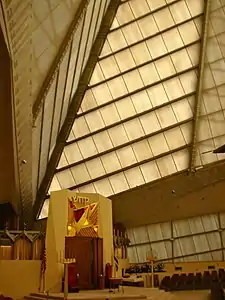 Looking southeast
Looking southeast Roof
Roof Looking west
Looking west Light fixture
Light fixture Entrance, looking north
Entrance, looking north View from the side
View from the side Roof detail
Roof detail Roof detail
Roof detail Front View
Front View National Historic Landmark plaque
National Historic Landmark plaque
See also
References
- "National Register Information System". National Register of Historic Places. National Park Service. July 9, 2010.
- "Beth Sholom Synagogue". National Historic Landmark summary listing. National Park Service. Archived from the original on 2008-06-08. Retrieved 2007-11-12.
- "PHMC Historical Markers". Historical Marker Database. Pennsylvania Historical & Museum Commission. Archived from the original on December 7, 2013. Retrieved December 30, 2013.
- Joseph M. Siry, Beth Sholom Synagogue: Frank Lloyd Wright and Modern Religious Architecture (University of Chicago Press, 2011)
- "Interior Secretary Kempthorne Designates 12 National Historic Landmarks in 10 States". U.S. Department of the Interior Press Release. 2007-04-04. Archived from the original on 2007-05-02. Retrieved 2007-04-15.
- https://www.valleyforge.org/blog/post/discover-montcos-house-of-peace/
- https://www.bh.org.il/beth-shalom-elkins-park-pennsylvania/
Further reading
- Siry, Joseph M. Beth Sholom Synagogue: Frank Lloyd Wright and Modern Religious Architecture (University of Chicago Press, 2011) 705 pp.
- Storrer, William Allin. The Frank Lloyd Wright Companion. University Of Chicago Press, 2006, ISBN 0-226-77621-2 (S.373).
External links
| Wikimedia Commons has media related to Beth Sholom Synagogue. |
